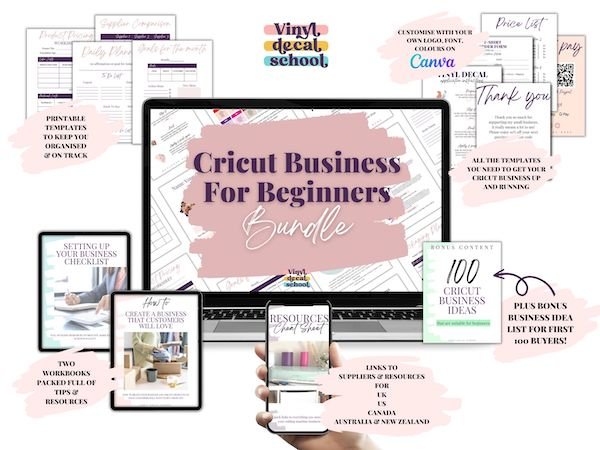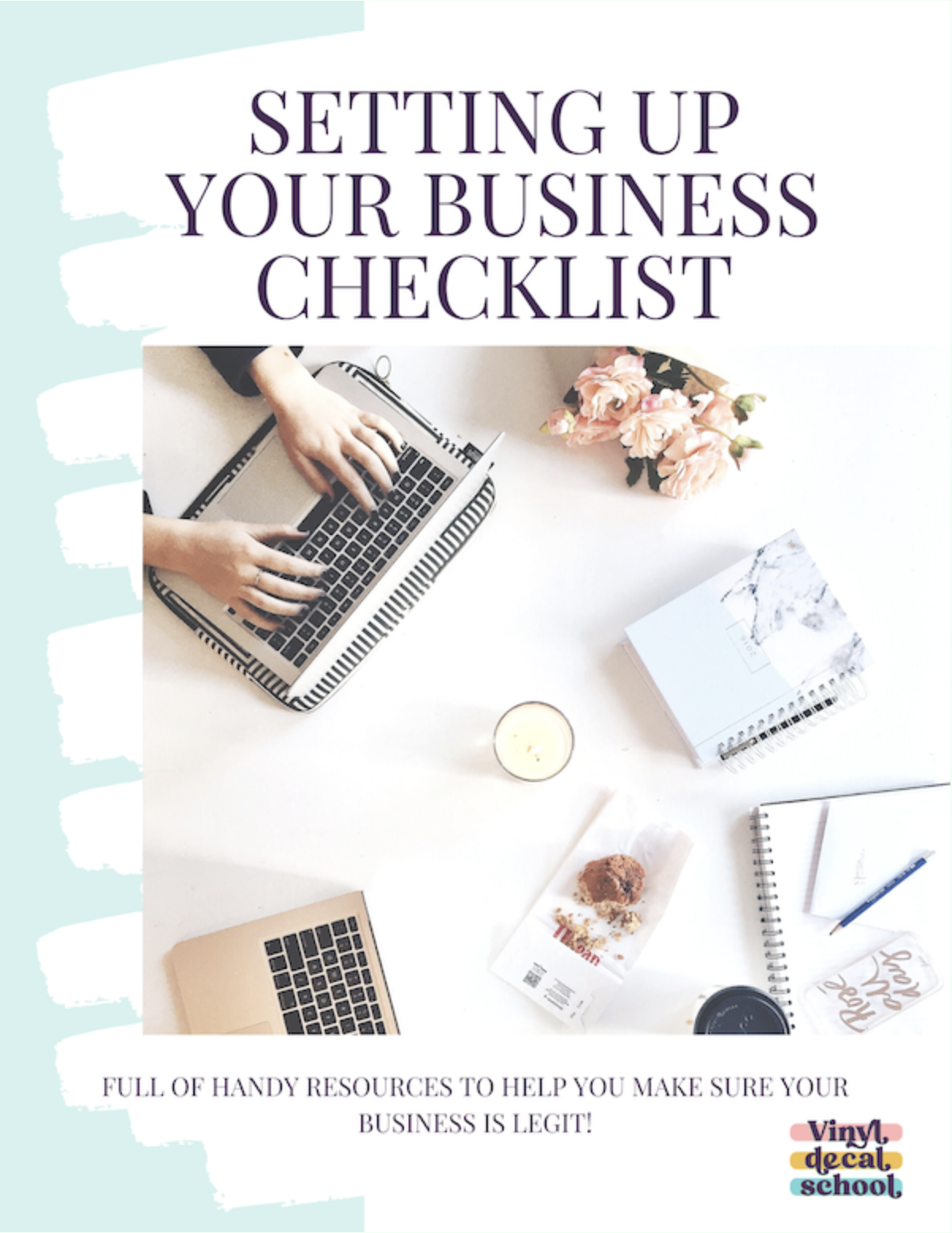How To Start A Cricut Business - 7 Things To Consider
In 2017 I quit my job to do something more creative. I tried lots of different things but it was only when I found the world of Cricut and started selling wedding decals that I actually started making a full time income. It didn’t happen right away though, it took me a while to figure out branding, who my audience was, and how to actually make a profit. I literally listened and watched anything and everything I could about small businesses, and Cricut and Etsy, and made lots of mistakes along the way before I got where I am today.
And so you don’t have to put as much time into researching as I did, and you can get right to it, I’ve actually put everything I know into a Cricut Business for Beginners bundle - it includes:
• A step by step guide to creating an engaging business that customers actually want to buy from
• A checklist to make sure your business is set up properly (& legally)
• A handy cheat sheet with links to all of the suppliers you might need for your business
• 15 Editable Canva templates for all of your Cricut business stationery needs
• 6 Printable planner sheets to help you reach your business goals and organise your products
• PLUS a bonus 100 Cricut Business ideas list (available for a limited time only)
But in this post, I also thought I would just go over a few of the key things that I think are important when starting a craft business with your cutting machine to give you an idea if it’s for you. Obviously, this is just from my experience, and doesn’t count as legal or financial advice - what worked for me, may not work for everyone! But hopefully, you’ll find it helpful.
The below content contains affiliate links and we may earn a commission if you shop through them, however, this won't cost you anything, it just helps us to keep the site running for free. For more information on affiliate links, see the disclosure here.
First, get to know your Cricut machine
Before selling anything, make sure you are fully confident with your Cricut or cutting machine and you have a good understanding of how to use it. You don’t need to be an expert at all, but getting a grasp on the basics now will make it easier to figure out what you would like to sell, what materials you will need and roughly how long things will take to make. Even if it’s just trying basic things like cards or vinyl decals, it will give you an idea of what you enjoy making as well.
Check out these pages to get you started:
There are so many tutorials online.
I have lots here on my Youtube channel, especially if you want to learn Vinyl Decals,
I also think Jennifer Maker, Makers Gonna Learn, Layla’s Cricut Creations and Angie Holden are some of the biggest and best to check out for Cricut inspiration and help, and Silhouette School is the best if you have a Cameo.
Decide on an audience
Although you can sell to a variety of people if you want, I do think it makes it a lot easier to focus on one particular type of audience when you first start out so that you can cater everything to them, and promote your products in the places that they are likely to hang out. Plus it’s a lot easier to have a smaller range of products when you first start anyway, then you don’t have to spend as much time and money making prototypes.
Then when you have started selling more you can think about branching out to a wider audience. For example I started out with weddings, but now my customers also come back to me for christening and birthday decals, as well as gifts for other occasions.
Photo by Porapak Apichodilok
Brand your business
I personally think consistent, and good quality branding is so important and makes you seem a lot more legit as a small business. When I first started my decal business, my logo was awful and I didn’t really understand what branding was, so my Etsy shop just seemed like more of a hobby than a business that should be trusted and taken seriously.
You can design your own logo and branding on somewhere like Canva when you’re just starting out, and they have brand board templates that you can fill in with your chosen colours, fonts and any other things that represent your business.
If you have the budget, and really want to take your venture seriously then you could consider looking into someone designing everything for you. Or that could be something you at least consider further down the line anyway.
Do some research on products
Before trying to sell anything, it’s imperative that you do some research to check first that there is actually a market for what you want to sell. SEO keyword tools are perfect for this, as when you search for your product keywords, it will come up with how many customers have already looked for that thing. I use eRank for this to look for search history on Etsy specifically.
You also want to make sure that this particular product hasn’t got too much competition too. Obviously, a lot of products you can make with a Cricut will have A LOT of competition, but if you can find styles or types of that product that have less competition, or can think of a way to stand out from others then that will give you a good head start.
The serious bit
Then the more serious stuff - this can differ depending on where you’re based but you will probably need to register as a sole trader or as a business in order to start selling and paying tax on what you make. If you’re unsure which route to go down then it’s best to check with your local authority and see what they recommend. (Find out more here about setting up a business).
This also goes for any potential licenses, insurance, permits or product testing that you may need too. Although most craft businesses are fairly straightforward to set up in this area and may only need insurance and nothing else, it can depend on what you sell. For example, if you wanted to make something that included food that usually requires special licenses, or if you wanted to sell baby clothes or toys, that will often need special testing first.
My bundle has a ‘how to set up your business so it’s a legit’ checklist full of resources, with way more information on this stuff if you weren’t sure where to start.
How much to charge
Another important aspect to consider when starting to sell your products is that you’re actually charging enough to make a profit.
It’s helpful to look at what others are selling their products for to give yourself a ballpark figure.
However, you need to make sure you’re covering the costs of your materials, your time, and any fees from Etsy or wherever you’re selling. You may even want to cover things like marketing costs, software costs, machine maintenance, a little extra in case of any mistakes, plus a profit margin.
That does sound like an overwhelming amount, but all those extras shouldn’t really work out too much, and you really just need to make sure that this business is financially worth the time and effort that you’re putting into it.
It also helps if you can find good quality suppliers that you can buy in bulk from for a cheaper price, as this will make sure your profit margin stays high and that you’re less likely to get complaints from customers and have to do refunds.
Marketing
Marketing is also a really key part of owning a business, so do think about how you’re going to show off your products to potential customers. Again this is a good reason to have a specific customer in mind when you’re making things, because if you wanted to target other local small businesses then local Facebook groups and LinkedIn might be good options. Whereas for people planning weddings, Pinterest and wedding fayres would be better.
Obviously, it’s a lot of hard work and there are lots to think about, but getting my Cricut and starting my business literally changed my life so I would recommend it to anyone who thinks they would enjoy and benefit from it. And if it’s something you’ve always wanted to do but haven’t got around to yet, if you’ve watched this far then I think that’s the sign that this is your year to start!
Again, if you’re at the beginning of your Cricut business journey then don’t forget to check out my bundle for where I go way more depth into a lot of these things.
And if you don't have a cutting machine yet, check out the deals here:
►►OPEN AN ETSY SHOP WITH 40 FREE LISTINGS
Let me know if you have any questions in the comments.
Remember to Like Follow and Subscribe for more videos like this in future!







